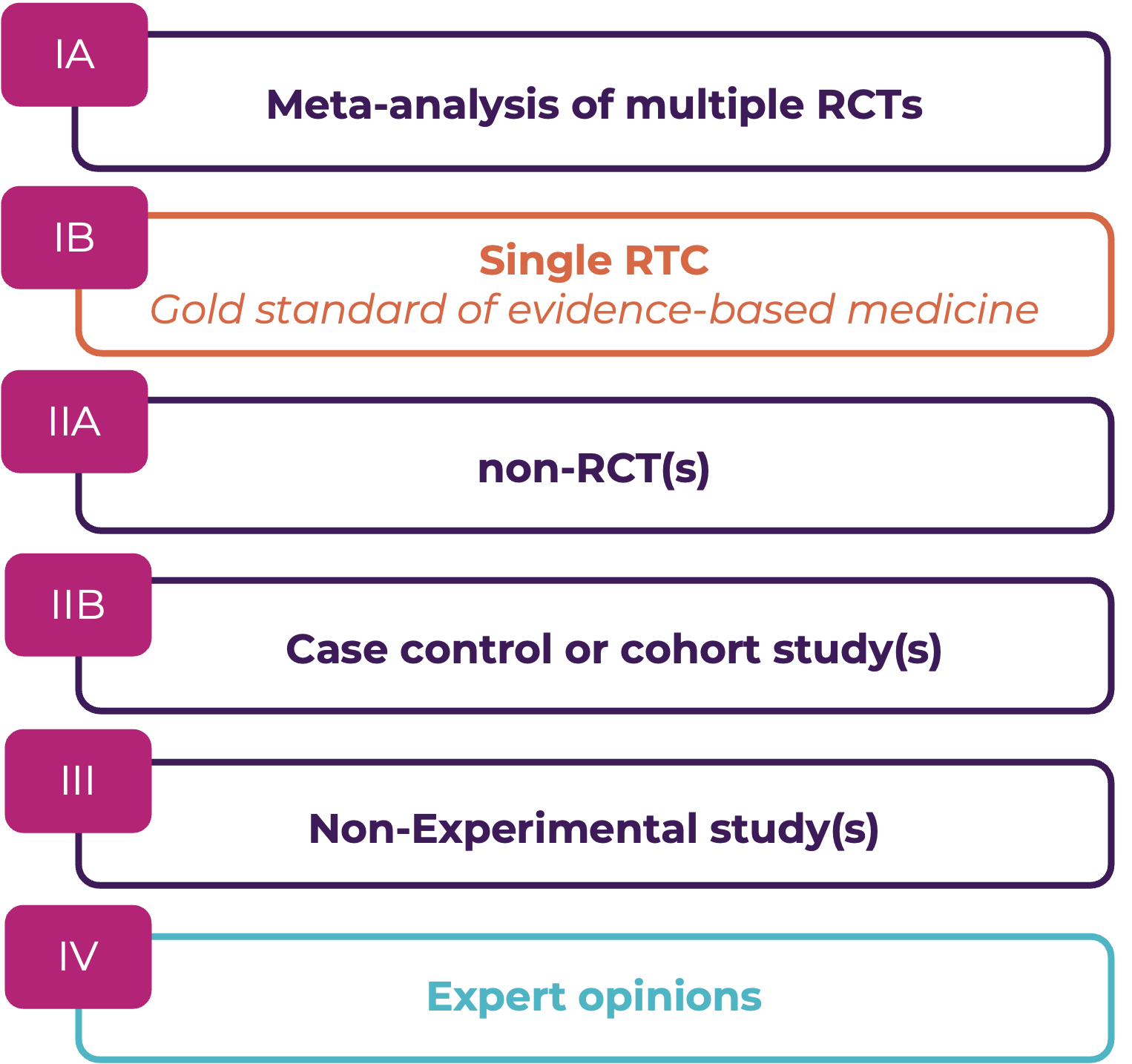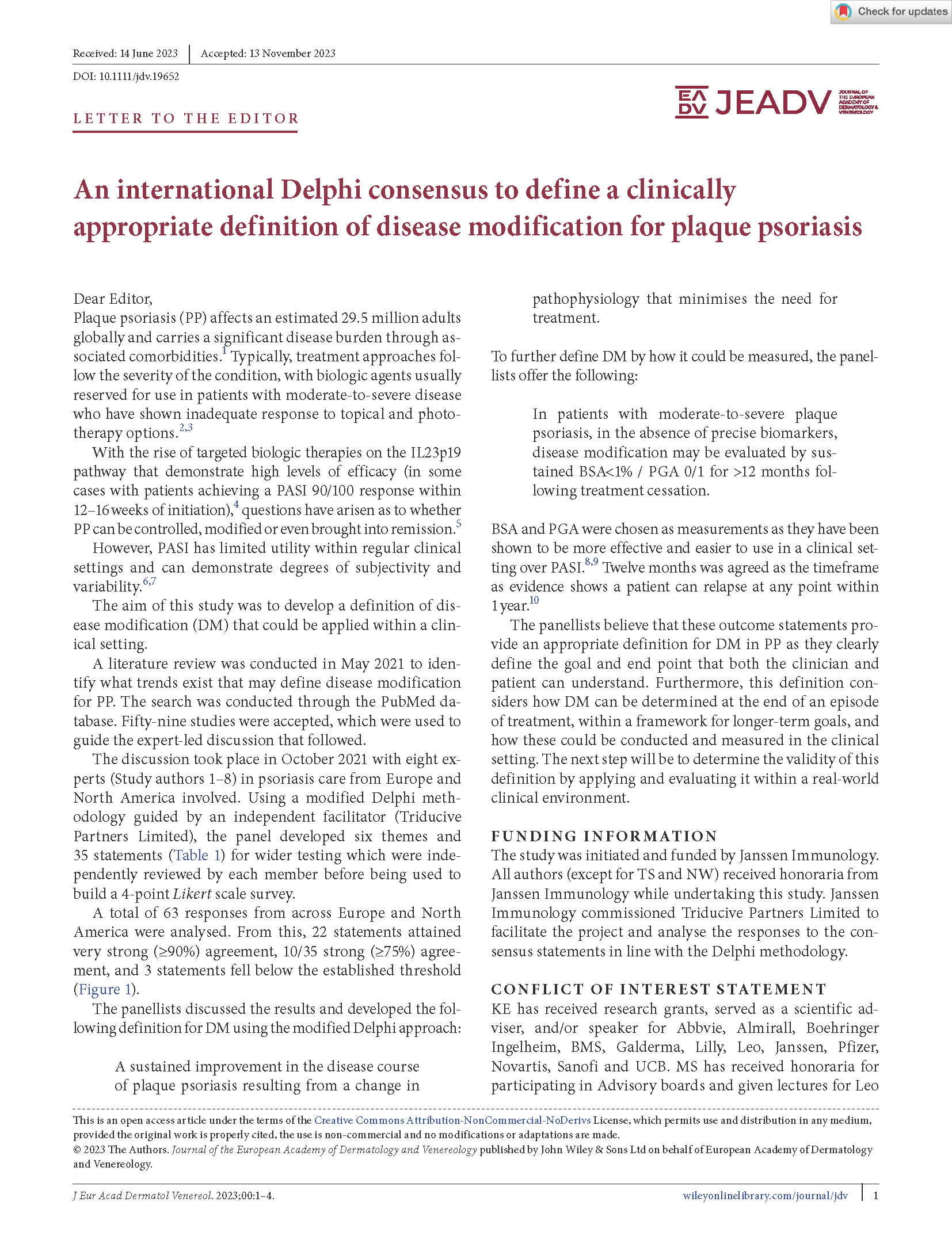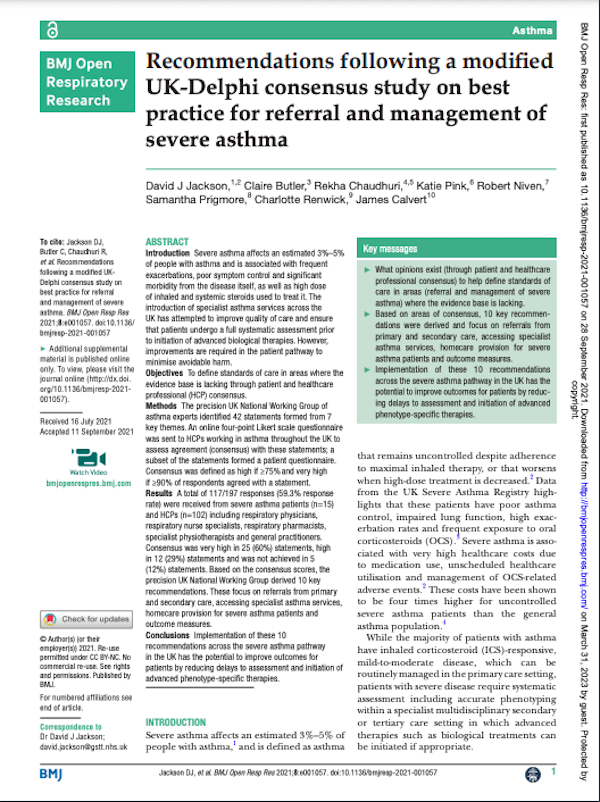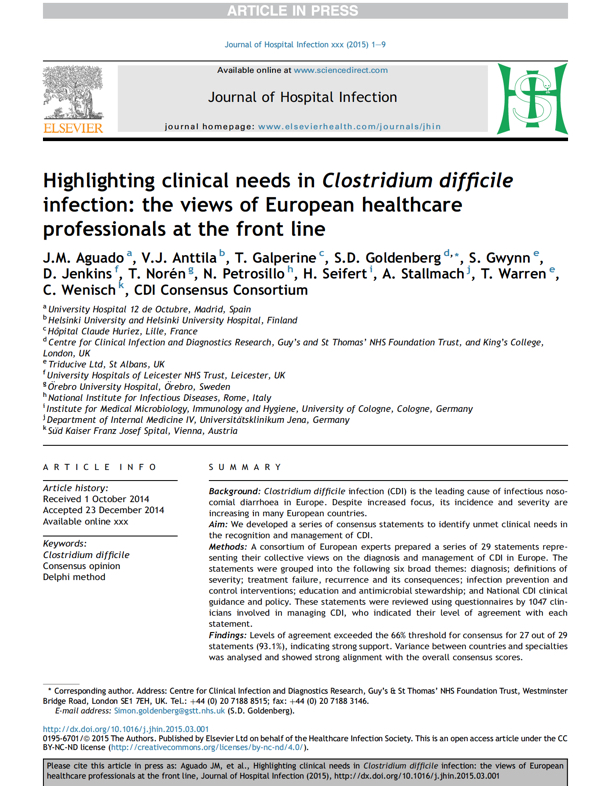The Use of Delphi Consensus within Evidence-Based Medicine
What is evidence-based medicine and what steps does it include?
Evidence-based medicine is an approach to systematise data at an appropriate level to make changes in healthcare.1 It includes five steps (Figure 1).1,2
Figure 1. Steps of evidenced-based medicine1,2
The initial step in evidence-based medicine is identifying a problem that needs addressing. In order to bridge this gap in healthcare, the next step aims to find supportive evidence.1
What different types of evidence exist?
Given the various types of evidence sources, there was a need to classify evidence hierarchically to prioritise information.3 In the 1980s, Canadian scientists proposed a “critical appraisal” system for ranking literature sources.3,4 Subsequently, this ranking system was modified, resulting in the modern classification with six evidence levels (Figure 2).1
Figure 2. Levels of evidence1
The ranking of evidence is based on the potential for bias and systematic errors.3 Although, according to the system, meta-analysis of multiple randomised-controlled trials (RCTs) is considered the highest level of evidence, RCTs remain the gold standard of evidence-based medicine.1,3 However, sometimes RCTs may not be the appropriate method to address unmet healthcare needs.3,5 Additional limitations of RCTs include the high cost, long duration, and the difficulty in accessing long-term results.5 Thus, the use of other types of evidence is required.3
In contrast to higher-level evidence, expert opinion evidence allow for the generation of the latest information based on recent observations and existing data that can influence decision-making in healthcare. Consensus can play a vital role when there is a lack of other evidence or when existing evidence is contradictory or not taking into consideration context.6
How does Delphi consensus fit within evidence-based medicine?
Consensus-based techniques allow for the generation of information that is Level 4 evidence – Expert opinions. Among these techniques are the Delphi consensus; nominal group technique (NGT); RAND/University of California, Los Angeles appropriateness method; informal consensus; and consensus development conference.7–9 The Delphi consensus, including the modified approach, is the most commonly used method, accounting for 76.2% of all consensus studies.10
Over the last few decades, the exponential growth in Delphi consensus studies in medicine and healthcare have been observed.11 Nearly 2/3 (65%) of all studies based on the Delphi consensus approach are published in medical journals.12 Delphi consensus is based on the opinions of experts who are authorities in specific therapeutic areas. This technique is commonly used across various fields in healthcare to forecast outcomes, address unmet needs, build consensus around various clinical issues, establish practice standards, develop and assess clinical guidelines, policies, and tools.13,14
Delphi consensus can be achieved within 6–8 months, making it a fast, well-structured, and cost-effective method to obtain the required information. The ACCORD and CREDES guidelines regulate reporting helping to assess the credibility of publications based on the Delphi consensus technique.15,16
Based on Triducive’s experience, the Delphi consensus methodology has proven to be useful in generating evidence that can be published and support changes, for instance in the management of diseases, healthcare pathways, and currently accepted guidelines, through advocacy campaigns. A few examples are represented below:
Discover how Triducive can help
Triducive is an expert medical communications agency that generates consensus-led evidence, which is published and supports change in healthcare. Through Delphi consensus studies, Triducive has experience in publishing over 50 manuscripts in peer-reviewed journals. Our team of healthcare experts and scientific writers is ready to provide guidance and support at any stage of the evidence generation process. Contact us for more information about Delphi consensus studies.
References
- Tenny S & Varacallo M. Evidence Based Medicine. [Updated 2022 Oct 24]. In: StatPearls [Internet]. Treasure Island (FL): StatPearls Publishing; 2024.
- Kang H. Korean J Anesthesiol 2016;69(5):435–445.
- Burns PB et al. Plast Reconstr Surg 2011;128(1):305–310.
- Sur RL & Dahm P. Indian J Urol 2011;27(4):487–489.
- Frieden T. Why the ‘gold standard’ of medical research is no longer enough. 2017 (accessed March 2024).
- Raveenthiran V & Kumar Sarin Y. J Neonatal Surg 2015;4(3):26.
- Gottlieb M et al. AEM Educ Train 2023;7(4):e10891.
- The RAND blog. Generating Evidence Using the Delphi Method. 2023 (accessed March 2024).
- Black N et al. J Health Serv Res Policy 1999;4(4):236–248.
- Humphrey-Murto S et al. Acad Med 2017;92(10):1491–1498.
- ACM Guide to computing literature, AMED, Business source complete, CINAHL, ERIC, PsycInfo, PubMed, RAND Library Catalog, Scopus, Web of Science.
- Khodyakov D et al. PLoS One 2023;18(8):e0289009.
- Shang Z. Medicine (Baltimore) 2023;102(7):e32829.
- Sablatzky T. Hypothesis 2022;34(1):1–6.
- Junger S et al. Palliat Med 2017;31(8):684–706.
- Gattrell WT et al. PLoS Med 2024;21(1):e1004326.







